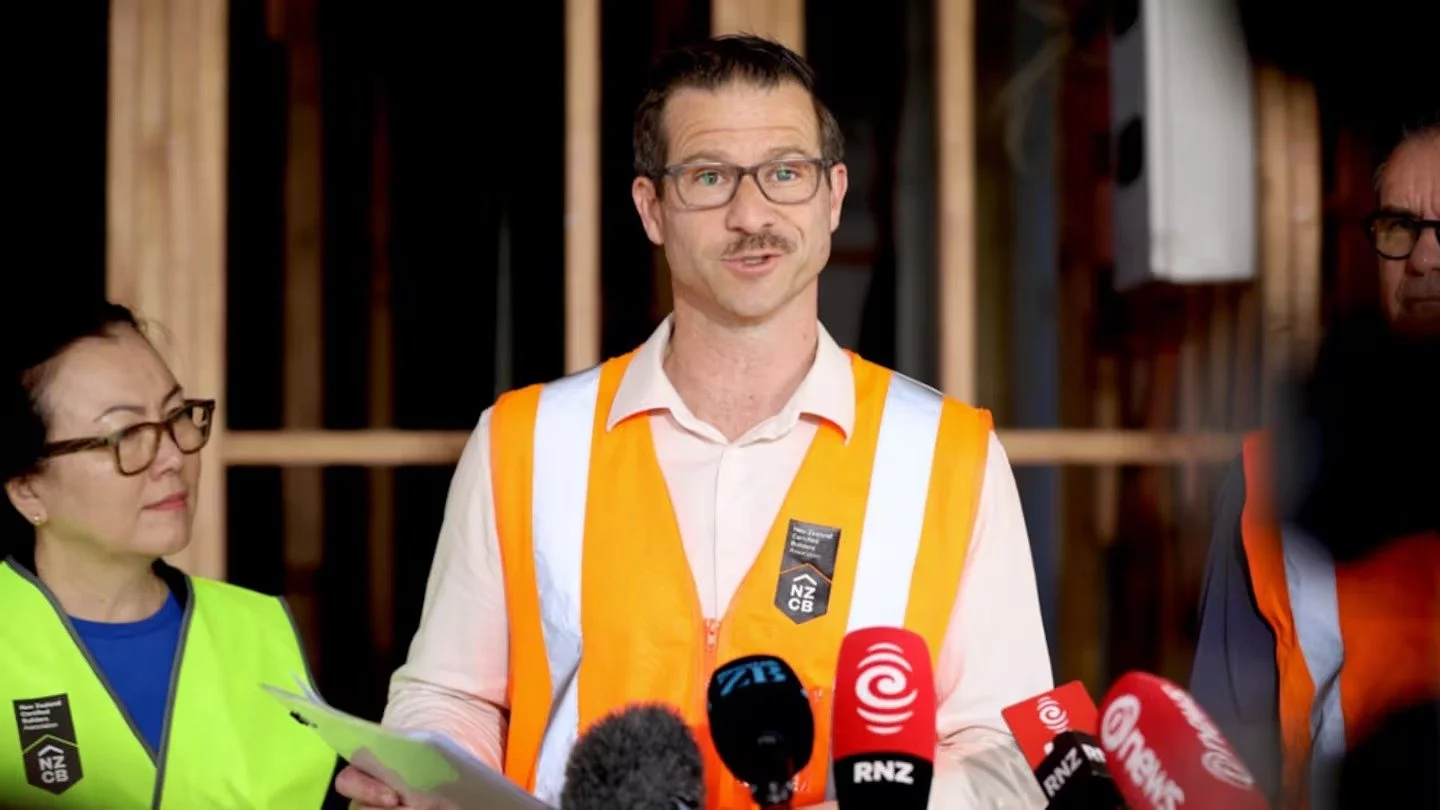
Michael Thornton, Barrister and Solicitor, is a specialist litigation firm based in Auckland’s CBD.
We have a wealth of experience in all aspects of commercial litigation with a particular focus on litigation generated through building issues. Our main areas of practice are construction disputes, landlord and tenant law, and insurance.
Michael’s principal areas of expertise are in building and construction litigation, landlord and tenant law, and insurance litigation. Since 1996 he has had experience in dealing with various building defect and leaky building cases.
More on our background and team.
Recent Articles:
Proposed Building Amendment Bill – Liability and Warranty Reforms. The reforms signal a move from joint and several liability (where Councils often bore 100% of the risk as the "last man standing") to a proportional liability model, supported by mandatory warranties and professional indemnity insurance.
The High Cost of Doing Nothing About Your Leaky Home. The best idea for dealing with a worrying problem can be to sleep on it. But not for too long, and certainly not for over a decade. We recently acted in a High Court appeal involving a leaky home and the exceptionally long time its owners took to act on their problem.
Our Expertise
INSURANCE LAW
Our team has extensive experience in all aspects of insurance law and routinely advises on issues of policy coverage, including exclusion clauses, particularly in the context of public liability and professional negligence policies.
LEAKY BUILDINGS
Since 2005 our team has specialised in all aspects of leaky building litigation. We achieve compensation for homeowners and bodies corporate to repair their leaky houses, apartments and units. We also represent parties being sued: generally developers, builders and other tradespeople, their companies and their directors; sometimes parties who did not perform the original construction work, such as pre-purchase inspectors or former owners.
gENERAL COMMERCIAL LITIGATION
Our team has extensive experience in all aspects of commercial litigation. We have been involved in resolving contract and negligence disputes encompassing a diverse range of subject matter, such as ocean going yachts, real estate, second hand truck engines, and the supply of animal feed.
CONSTRUCTION LITIGATION
The firm has expertise in bringing and defending claims made under the Construction Contracts Act. Our focus is to achieve the most cost effective outcome that meets our clients’ needs.
The Processes
“Mike represented me when a home I had previously owned became leaky and I was subject to a claim. He was very detailed in his advice and the matter was settled in a calm and orderly fashion. Given this was not my area of expertise and my understanding of the process was limited, it was great to have him in my corner getting me through the claims process. I would personally endorse Mike in this area and would happily talk to anyone directly about him.
- Pip Mayne
”
KEY CONSIDERATIONS
Our team will guide you through the applicable process and advise the best strategy suited to your needs.
We recommend an initial meeting to enable us to understand your particular situation.
Attached below are example documents outlining possible processes depending on your situation:
PDF Versions:
IMPORTANT GUIDELINES DEFINING OUR OBLIGATIONS
INFORMATION FOR CLIENTS
Here is the information required by the Rules of Conduct and Client Care for Lawyers of the New Zealand Law Society. Click here for the PDF
STANDARD TERMS OF ENGAGEMENT
These Standard Terms of Engagement apply in respect of all work carried out by Michael Thornton, Barrister & Solicitor, for you, except to the extent that we otherwise agree with you in writing. Click here for the PDF
News & Articles
The Government's building law reforms are being sold as a major win for homeowners, but a crucial detail in the fine print means that promise may not hold when it matters most.
The reforms signal a move from joint and several liability (where Councils often bore 100% of the risk as the "last man standing") to a proportional liability model, supported by mandatory warranties and professional indemnity insurance.
For homeowners, key questions and considerations regarding a leaking building issue should focus on your legal options, the viability of your claim, and the settlement process.
Chatted to Peter Wolfkamp about the proposed changes to proportionate liability, specifically what consumer protection measures could be part of the change. Will be interesting to hear from Minister Penk who is on Peter's show next Sunday as to what the government is proposing.
Though the house had serious weathertightness problems, two of the reports cleared the property, while just one identified moisture issues and recommended further investigation.
"This year alone, the New Zealand Herald has reported on big building fails, including apartments in Kingsland where owners were given a choice between a minimum $36.6 million bill to fix or $82.9m to demolish and rebuild; and owners of The Ridge apartments in St Marys Bay won court approval to sell the land beneath their "wrecked homes" and walk away."
The property on Seabreeze Road was built at the start of the leaky homes era and was offered to the market without warranties. Harcourts agent Jane Hastings had pitched the property as a demolition opportunity, noting in the listing that buyers were getting a “free house” with the purchase of the land.
On March 17th, I was a guest on The Resident Builder Podcast with Peter Wolfkamp on Newstalk ZB. We covered several topics, including developer’s access to neighbouring property.
The best idea for dealing with a worrying problem can be to sleep on it. But not for too long, and certainly not for over a decade. We recently acted in a High Court appeal involving a leaky home and the exceptionally long time its owners took to act on their problem.
On 2nd October I was a guest on The Resident Builder Podcast with Peter Wolfkamp on Newstalk ZB regarding a recent leaky building decision.
On 17 July I was a guest on The Resident Builder Podcast with Peter Wolfkamp on Newstalk ZB. We touched on the plasterboard shortage and other building supply issues.
On this week's edition of The Resident Builder podcast, building disputes expert, Mike Thornton joined Peter Wolfkamp.
Homeowners with an earthquake damaged house had to pay wasted costs for two cancelled court events because their expert’s report was late: Alexander v Southern Response Earthquake Services Ltd [2020] NZHC 1660 [10 July 2020].
The High Court has held (Singh v Boutique Body Corporate Limited [2019] NZHC 1707 19/07/19) that members of a body corporate committee owe no duty to a member disgruntled at paying levies to repair weathertightness issues.
Auckland lawyer Mike Thornton, a specialist in leaky building cases, says many people in the Browns’ predicament have sued Auckland Council for issuing a Code Compliance Certificate (CCC) for a defective building.
The High Court held a dispute resolution clause in a homeowners’ contract with their builder to build their house did not prevent them cancelling the contract when the builder left site due to non-payment of invoices.
Finds a wide variation in the standard of reporting, and calls for a licensing scheme. MBIE has shown no interest in reform so far.
The recent High Court decision holding Hawkins Construction liable to pay $13.4m plus GST to repair a leaky school[1] has been in the news, probably because of the size of the judgment (though it's not the biggest leaky building judgment) and that it is a school with a role of nearly 2000.
Can you sue the person who sells you their leaky house because before you bought they told you it wasn’t? The answer is: no, though it may depend on what court you end up in.
The High Court said yes: Mason v Magee [2017] NZHC 51.
The Court of Appeal said no: Magee v Mason [2017] NZCA 502
A recent High Court decision has confirmed that the ownership of an apartment as part of a unit title is not “all for one, one for all” when it comes to decision making. The wishes of the majority can override the interests of a minority.
I came across this broadcast where Ali Mau was joined by John Green, Director of Building Dispute Tribunal and BuildSafe, covering what you should do before getting a builder in for a renovation or build.
New Zealand appellate courts delivered significant judgments just before Xmas in the never-ending leaky building saga.
As of 1 March 2017, the amount claimable in the District Court will increase from $200,000 to $350,000 (The District Court Act 2016).
The Construction Contracts Act 2002, a statute designed to ensure a cash flow on building projects, now applies to building professionals (e.g. engineers, architects, quantity surveyors), carrying out work for construction projects.
The Supreme Court has dismissed an attempt by Carter Holt Harvey to strike out a case against it in respect of leaky schools allegedly arising from its negligent manufacture of cladding material.
A lifestyle block owner recovered from two insurers the costs of fighting a fire which spread from a burn heap on their Canterbury property to neighbouring properties. The property was insured with AMI, and their landscaping business was insured with Lumley.
In a recent appeal from the District Court, the High Court has confirmed that unit-owners in Body Corporates cannot refuse to pay portions of the levies because they do not agree with the purpose for which levies have been struck.
The Court of Appeal held recently that the powers provided to a body corporate (under the Unit Titles Act 2010 (“the Act”)) to carry out repairs to a complex to the benefit of all owners, trump individual owners’ rights to choose how, when and whether they repair and maintain their units.
In Body Corporate 204299 & Sayer v Whyte & Ors [2016] NZHC 1164 the High Court held that where the division of property between private and common property in a body corporate complex are ‘skewed’ in favour of some owners, the court will not intervene to ameliorate its effect on other owners when the complex is being repaired, as to do so would disturb the contractual rights which the owners acquired when buying into a unit title development.
The Supreme Court has granted leave to an investor in Ross Asset Management (RAM) to appeal the Court of Appeal's decision ordering him to repay the (fictitious) profits, but not his original investment, to the liquidators of RAM.







